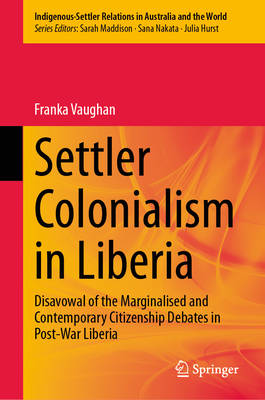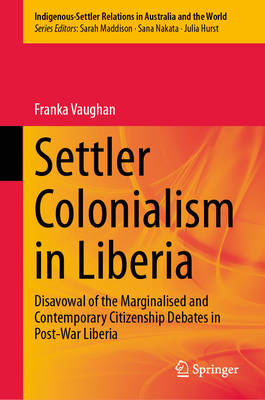
- Afhalen na 1 uur in een winkel met voorraad
- In januari gratis thuislevering in België
- Ruim aanbod met 7 miljoen producten
- Afhalen na 1 uur in een winkel met voorraad
- In januari gratis thuislevering in België
- Ruim aanbod met 7 miljoen producten
Settler Colonialism in Liberia
Disavowal of the Marginalised and Contemporary Citizenship Debates in Post-War Liberia
Franka VaughanOmschrijving
This book is a retelling of the history of Liberia s formation through the lens of settler colonial theory to understand the antagonisms that continue to shape contemporary citizenship debates. It discusses Liberia as representing an interesting puzzle on the distinction between settler colonialism and postcolonialism. While Liberia is often heralded as one of two African countries that were never colonised, this book presents the country as a unique settler state established by free and formerly enslaved Black Americans, who, the author argues, were settler-colonists despite their positioning as Black people in the slaveholding regime. The book, therefore, complicates conventional perspectives by unravelling Liberia s settler colonial present , highlighting the persistent impact of historical structures on the contemporary socio-political landscape. It shows that when the Black Americans dispossessed and marginalised the Africans they met upon arrival in Liberia, they established the antagonisms and enduring unequal structures that continue to shape citizenship and identity debates in the post-war era. By exploring Liberia's contemporary and contentious discourse on dual citizenship, the book delves into the nuanced terrain of claims and counterclaims surrounding proposed changes to the country's citizenship laws.
Specificaties
Betrokkenen
- Auteur(s):
- Uitgeverij:
Inhoud
- Aantal bladzijden:
- 188
- Taal:
- Engels
- Reeks:
- Reeksnummer:
- nr. 9
Eigenschappen
- Productcode (EAN):
- 9783032099327
- Verschijningsdatum:
- 28/01/2026
- Uitvoering:
- Hardcover
- Formaat:
- Genaaid
- Afmetingen:
- 155 mm x 235 mm
- Gewicht:
- 420 g

Alleen bij Standaard Boekhandel
Beoordelingen
We publiceren alleen reviews die voldoen aan de voorwaarden voor reviews. Bekijk onze voorwaarden voor reviews.









